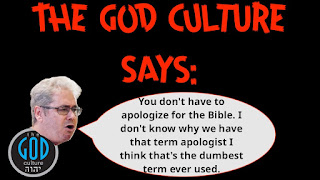Timothy Jay Schwab who is The God Culture employs Greek and Hebrew etymologies for many of his arguments. But as Tim admits, he is no linguist. This fact is shown in a hilarious manner when he says "apologist" is the dumbest term ever used.
 |
| Exploring Eden's Waters: Unraveling the Mystery of the Rivers with Zen Garcia & Tim Schwab |
1:01:14 Lisa George: Hey Tim real quick, uh, there's a question in chat. I'm not sure if you're taking these in chat but this kind of goes along with the same topic that we're talking about with the flood and it's a little bit off, um, slightly off topic. I'm curious to see your information on this too. Uh, Sue says, "What do you think about the ark encounter? Is it a fair assessment?" Now, we were just there a couple years ago. I have my own opinion about that. I don't know if you've actually been there.
Timothy Jay Schwab: I haven't because honestly I never had enough interest and I love the whole flood narrative. Uh, but the stuff that I see coming out of those guys, uh, because they, they, they're, they're stuck in, you know, this creation science, uh, genre which is, unfortunately, just as bad as modern science. Maybe worse because a lot of times what they're doing is they're placating modern scientism a religion an occult religion and they're infusing that into the Bible they're trying to make it fit they're trying to make it work. You don't have to do that. You don't have to apologize for the Bible. I don't know why we have that term apologist I think that's the dumbest term ever used. You don't have to apologize for the Bible. You have to apologize for modern science when it disagrees with the most credible source in all of history. Because the Bible's roots don't just go back to man and this is the fallacy that we hear from many, oh man wrote the Bible you can't trust it. Wait a minute didn't man write that science journal? So you can't trust that either, right? Hello?
See what Tim is doing here? He is saying apologetics means saying, "I'm sorry." But that is not the case. The English word apology and the Greek word apologia, from which the word apologetics is derived, do not mean the same thing.
The term apologetics derives from the Ancient Greek word apologia (ἀπολογία). In the Classical Greek legal system, the prosecution delivered the kategoria (κατηγορία), the accusation or charge, and the defendant replied with an apologia, the defence. The apologia was a formal speech or explanation to reply to and rebut the charges. A famous example is Socrates' Apologia defense, as chronicled in Plato's Apology.
In the Koine Greek of the New Testament, the Apostle Paul employs the term apologia in his trial speech to Festus and Agrippa when he says "I make my defense" in Acts 26:2. A cognate form appears in Paul's Letter to the Philippians as he is "defending the gospel" in Philippians 1:7, and in "giving an answer" in 1 Peter 3:15.
Apologia means a verbal defense and is in the New Testament 8 times.
 |
| https://www.blueletterbible.org/lexicon/g627/kjv/tr/0-1/ |
Acts 22:1 Men, brethren, and fathers, hear ye my defence which I make now unto you.
Philippians 1:7 But the other of love, knowing that I am set for the defence of the gospel.
Those are just two of the eight times "apologia" is used in the Bible. And what do you call one who makes an "apologia?" An apologist!
It's these little things that reveal the utter ignorance of Timothy Jay Schwab who is The God Culture.




Nah, that really is what that means. Look at what apologists do.
ReplyDeleteWell.. meh. The din du nuffin apologists count for that definition I guess
ReplyDelete